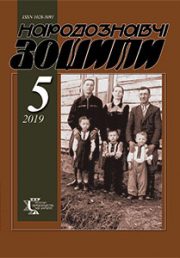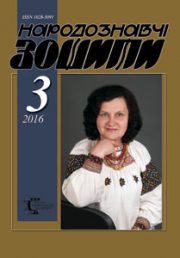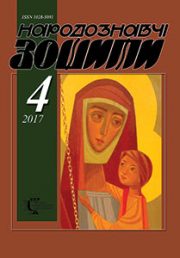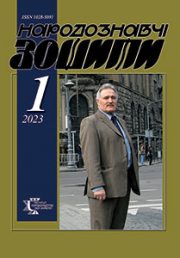The Ethnology Notebooks. 2021. № 5 (161), 1104—1112
UDK 821.161.2-92″18″(092)
DOI https://doi.org/10.15407/nz2021.05.1104
BELINSKA Ludmyla
- ORCID ID: https://orcid.org/ 0000-0002-4716-6011
- Candidate of Historical Sciences (= Ph. D. in history),
- Head of the Department of Sociocultural Management
- Ivan Franko National University of Lviv,
- 1, Universytetska Str., 79000, Lviv, Ukraine,
- Contacts: e-mail: ludmyla.belinska@gmail.com
Abstract. In the conditions of independent Ukraine, it seems relevant for Ukrainian scientists to return the names of socially active figures of past times who are contributed to the development of Ukrainian nationalization. Often the selfless, sacrificial actions of the Ukrainian intellectuals are not fully appreciated, there are no detailed analytical portraits of the genus from which they originate. One of the talented publicists, ethnographers, extras is the name of Volodymyr Navrotskyj. There is a repeated mistake regarding his personal data in the scientific literature like Volodymyr Andrejovich Navrotskyi, not Mikhailovich. The purpose of this article is to correct this mistake, to reveal the phenomenon of Volodymyr Navrotskyi as a promoter of «organic labor» for the people. The object of the research is the process of formation of the national consciousness of Galician Ukrainians by the intelligentsia in the second half of the XIX century, and the subject — public, journalistic activities of V. Navrotskyi. The methodological basis of the work is the principles of objectivity and historicism. To study archival, ethnographic, and epistolary material were used methods typological, complex and retrospective analysis, historical reconstruction, etc.
V. Navrotskyj’s work consisted of endless cold and hungry commissions on «Galician Siberia», which did not bring any wealth. The authorities removed the fines for the posts without his permission from Ukrainian newspapers. V. Navrotskyi was in national isolation in Ryashiv when the only source of communication was correspondence with friends and family. Ostap Terletskyj, Volodymyr Shashkevych, Meliton Buchynsky had remained best friends for him. Thanks to correspondence with such interesting and famous people we can recreate the living conditions of V. Navrotsky’s stay in Ryashiv, his emotional experiences, torment, longing, blows of fate, and the formation of economic, political, national worldview. Mykhailo Drahomanov was one of the recipients of the all-Ukrainian scale. In addition to lively correspondence, they had a meeting, which Drahomanov later mentioned in the «Austro-Hungarian memories».
Keywords: Galician Ukrainians, V. Nаvrotskyi, anti-drinking activity, family, enlightenment.
Received 27.10.2021
REFERENCES
- Institute of Literature of the National Academy of Sciences of Ukraine. T. Shevchenko in Kyiv. Department of manuscripts. F. 3 (Ivan Franko). Ref. 1602 [in Ukrainian].
- Hrytsak, Y. (2001). «What princes were the capitals in Kyiv?»: to the design of the historical memory of Galician Ukrainians in the 1830—1930s. Ukraina Moderna (Part 6, pp. 77—95) [in Ukrainian].
- Institute of Literature of the National Academy of Sciences of Ukraine. T. Shevchenko in Kyiv. Department of manuscripts. F. 3 (Ivan Franko). Ref. 4355 [in Ukrainian].
- Lviv Scientific Library V. Stefanyk. Department of manuscripts (Spr. 318. M. Buchynskyi) [in Ukrainian].
- Vytanovych, I. (1934). Volodymyr Navrotskyi (1847—1882). The first Ukrainian statistician-economist in Galicia on the background of his time. Lviv [in Ukrainian].
- Studynskyi, K.(1931). Galicia and Ukraine in correspondence 1862-1884. Materials on the history of Ukrainian culture in Galicia and its ties with Ukraine. Kharkiv; Kyiv: Proletar, 1931 [in Ukrainian].
- Franko, I. (1902). Dr. Ostap Terletsky. Reminiences and materials. Notebooks of T. Schevchenko Scientific Society (Vol. 50, pp. 1—64) [in Ukrainian].
- Franko, I. (1894). Diary of V. Navrotskyi. Life and word (Vol. 2, book 6, pp. 340—445) [in Ukrainian].
- Levitsky, K. (1936). History of political thought of Galician Ukrainians 1848—1914 on the basis of memories. Lviv [in Ukrainian].
- Shashkevych, V. (1894). Letter to V. Navrotskyi. Life and word (Vol. 1/2, book 1, p. 123) [in Ukrainian].
- Drahomanov, M. (1970). Austro-Ruthenian reminisy (1867—1877) (Vol. 2, pp. 151—288). Kyiv [in Ukrainian].
- Bryk, I. (1932). History of the Society «Prosvita» in Lviv. Lviv [in Ukrainian].
- Central State Historical Archives of Ukraine in Lviv. F. 362 [in Ukrainian].
- Horak, R. (2010). Lviv — the city of Ivan Franko. Lviv [in Ukrainian].
- Franko, I. Collection of works: in 50 vol. (Vol. 2, pp. 334—335). Kyiv: Naukova dumka [in Ukrainian].







